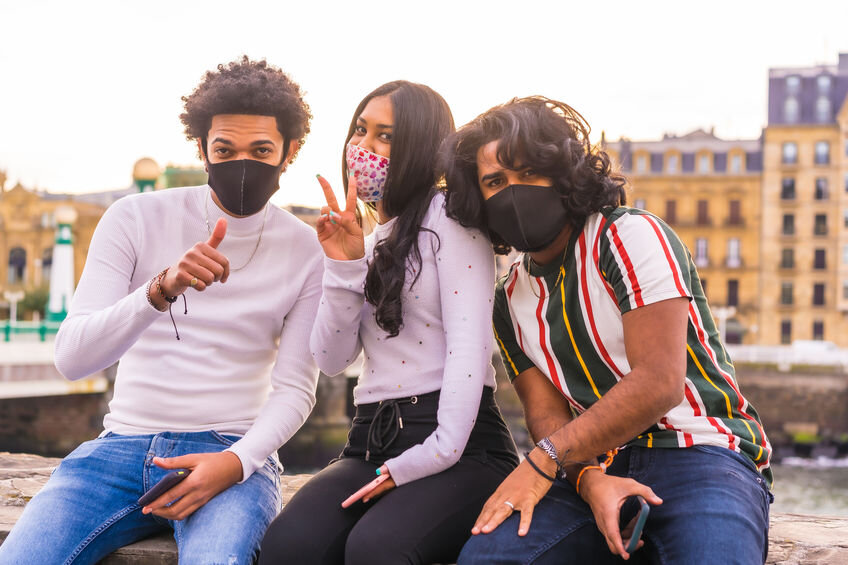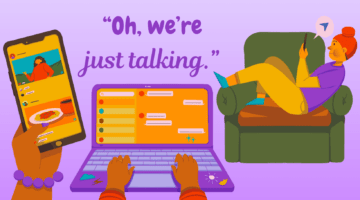How People in Open and Polyamorous Relationships are Navigating the Pandemic
January 6, 2021 by Justin Lehmiller
I’ve written a lot about how the COVID-19 pandemic is affecting people’s sex lives and relationships; however, most of the research that has been conducted on this topic so far has focused on people in monogamous relationships. So what about people who are in consensually non-monogamous relationships, such as those who are open or polyamorous? How is this pandemic affecting their relationships?
In our Kinsey Institute study on Sex and Relationships in the Time of COVID-19, we included questions that would allow us to determine people’s relationship structure so that we could examine how the pandemic is uniquely affecting persons in different types of relationships.
In our initial wave of data collection (conducted in March-April 2020), we surveyed just over 2,000 adults about their intimate lives. Of those who said they were currently in a relationship of some type (about three-quarters of our overall sample), most (81%) said they were in a sexually exclusive relationship. Of the remainder, 15% said they were currently in some type of consensually non-monogamous relationship, in which there is agreement among all parties that having additional sexual and/or romantic connections is permissible.
About 4% of our participants said they were currently in an exclusive relationship, but have had sexual or romantic relationships without their partner’s knowledge.
Among those who were consensually non-monogamous, most identified as either polyamorous (40%) or as being in an open relationship (31%), with fewer identifying as swingers (13%), engaging in cuckolding (3%), or being in some other type of sexually non-exclusive relationship (13%), many of whom identified as “monogamish,” “ethically non-monogamous,” or “relationship anarchists.”
We asked these individuals a series of questions about how they are navigating their relationships during the pandemic, and this is what they said:
· 65% reported texting or calling the partners they don’t live with.
· 48% reported that they were only physically interacting with the partners they lived with.
· 45% said they were social distancing from partners they don’t live with.
· 45% said they were keeping up with partners they don’t live with on social media.
· 38% said they were only having sex with partners they live with.
· 38% said they were video chatting with partners they don’t live with.
· 37% said they were sexting partners they don’t live with.
· 24% said they were playing online games or engaging in other, non-sexual virtual activities with partners they don’t live with.
· 19% said they were visiting partners they don’t live with.
· 19% said they were having cybersex with partners they don’t live with.
· 14% said they were having groceries or gifts delivered to partners they don’t live with.
In addition to the above, 13% of these folks reported other ways that they were navigating their relationships, including staying in touch with partners over email or writing letters, making supply runs for other partners, temporarily closing their relationship or shifting back to monogamy, stopping or limiting attendance at swingers’ parties, moving other partners in with them, and ending all relationships to be single for a while and self-isolate.
We also asked people to describe in their own words how the pandemic has affected their intimate relationships, for better or for worse. Here are some of the things they said:
“All of my partners and I have been in contact via phone and video chat and supporting each other. Yes it’s a bummer not to see them and exchange sexual energy and human touch, but we are all here for each other. A handful of new possible partners have temporarily been put on hold that I’ve met online. My interest in online dating has significantly dropped.”
“Allowed additional bonding time with my nesting partner. I miss my other partner and the lack of physical contact is difficult. We’ve discovered that we enjoy playing games together online, though!”
“Because of the shelter in place, I decided to leave my apartment and stay with my primary partner at his family’s house. I didn’t want to be alone, and also I’m having issues with my roommate. This has been the longest that my partner and I have ever continuously cohabitated, and it’s going well. I think it’s a sign that we could live together permanently (once he is financially stable). At the same time, I have had to hide our polyamory from his family as he isn’t out. It’s been difficult, because that means I haven’t been able to attend the virtual events that our community has been throwing. I’ve also had to be careful of where and how I talk to my other partners.”
“Because we are trying to social distance as much as possible, it has negatively affected my ability to see my partners frequently. I am in one more serious partnership and I have made one select trip to visit them before the shutdown in my city will leave us separated indefinitely. My second partner and I have been dating less long and saw each other less frequently, so I do not know how long it will be before I get to see her again. It is challenging not to know how long I will be apart from my partners, but we are getting creative with ways to spend time together virtually. I feel that overcoming this challenge together will teach me about how much we care for each other and how we navigate challenges.”
“I have three partners. The one that was more casual dating, I have not seen and am distancing from. That relationship seems to be fading and will probably end before the pandemic does, but it was already headed in that direction pre-COVID. The other two partners are committed and longer term. I live with one and our children; the other lives with his husband. We have combined our two households into one closed-loop ‘isolation pod,’ as if we were one household. None of us work outside the home right now and we live in freestanding homes (not apartment buildings) so don’t have to have contact with others outside our pod so our risk is low. Therefore we are able to continue to see each other. There has been a lot more closeness and intimacy with my non-nesting partner than there was before pandemic since we’re the only people we can spend time with outside our homes — we’ve jokingly referred to this as our ‘pandemic U-Haul.’ It has meant a lot more communication and gentleness to survive the suddenly increased levels of contact and intimacy, but has been overall good and sweet. Relationship with nesting partner hasn’t changed much.”
“I’m not ‘playing’ with anyone right now, or reaching out to them because when I did try to, just to check in they were all like ‘are you DTF?’ And I’m like, ummm no…..social distancing dumbass.”
“I’m only seeing one of my partners as I don’t want to expose everyone and to keep the quarantine bubble small. This is hard as each relationship has its own dynamic and chemistry and this is difficult to maintain with social distancing. For the partner I’m still seeing while quarantined and social distancing, our sex life has become even more electric and adventurous wi
th the extra time we have quarantined together.”
“Positive: It’s given me space to break my patterns and examine my relationships without hurting my partners. This is easier because I became sick with what I strongly suspect is coronavirus last week. I miss sex and companionship. However, I am glad to have a chance to really pause and ask myself if this is how I want my relationships to continue after the crisis has passed. Negative: My primary partner would like to move in with me after my quarantine is done. However, he also wants to spend time living with his other serious partner — I feel very strongly that this puts her household and mine in danger because we will never be able to truly know if someone has been exposed to coronavirus. I feel that he is being reckless and selfish. My partner’s casual attitude towards social distancing is making me seriously considering ending my longest ongoing relationship. The coronavirus puts his previous inconsiderate behaviors into a new light — it could literally be life-or-death.”
It’s important to note that these data were collected early on in the pandemic and that people’s views, attitudes, and behaviors may have shifted since. Also, our data do not come from a representative sample, so it’s not clear which trends are more or less common.
However, these findings do shed some unique light on how this pandemic has affected people in consensually non-monogamous relationships. As you can see, there have been a mix of positive and negative impacts (just like we’ve seen for people in monogamous relationships)—different people are reporting drastically different effects.
For some, relationships with one partner have become stronger—they are closer than ever—while other relationships have either not changed much or are struggling. We also see that people are finding new ways to connect and stay in touch with all of their partners, some are re-evaluating some of their relationships, and some are seeing this as an opportunity overcome challenges together and build stronger bonds.
Are you in a consensually non-monogamous relationship? What has the impact been for you? How has it changed over time? Please weigh in with your comments below.
Want to learn more about Sex and Psychology? Click here for previous articles or follow the blog on Facebook (facebook.com/psychologyofsex), Twitter (@JustinLehmiller), or Reddit (reddit.com/r/psychologyofsex) to receive updates. You can also follow Dr. Lehmiller on YouTube and Instagram.
Image Source: 123RF/Unai Huici

Dr. Justin Lehmiller
Founder & Owner of Sex and PsychologyDr. Justin Lehmiller is a social psychologist and Research Fellow at The Kinsey Institute. He runs the Sex and Psychology blog and podcast and is author of the popular book Tell Me What You Want. Dr. Lehmiller is an award-winning educator, and a prolific researcher who has published more than 50 academic works.
Read full bio >


